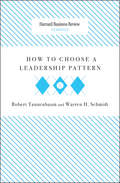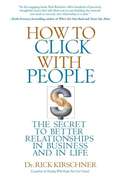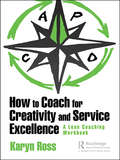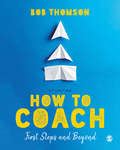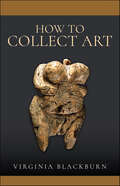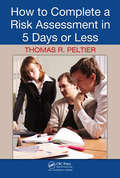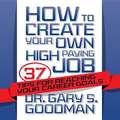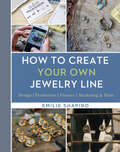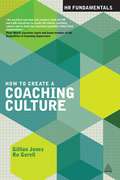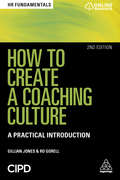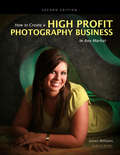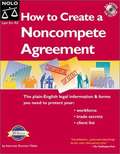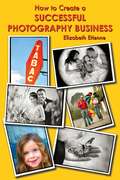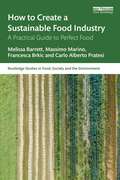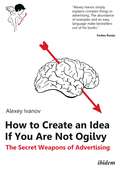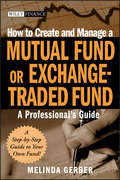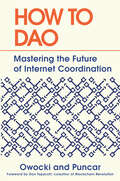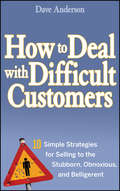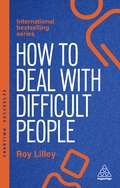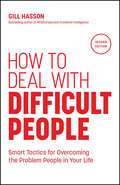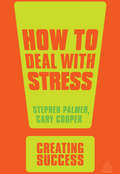- Table View
- List View
How to Choose a Leadership Pattern (Harvard Business Review Classics)
by Warren H. Schmidt Robert TannenbaumSince 1922, Harvard Business Review has been a leading source of breakthrough management ideas-many of which still speak to and influence us today. The Harvard Business Review Classics series now offers readers the opportunity to make these seminal pieces a part of your permanent management library. Each highly readable volume contains a groundbreaking idea that continues to shape best practices and inspire countless managers around the world-and will have a direct impact on you today and for years to come.
How to Choose the Right Forecasting Technique
by Donald D. Smith Satinder K. Mullick John C. ChambersTwo Corning Glass Works products illustrate the use of various forecasting techniques. Managers and forecasters should consider three issues when approaching a forecasting problem: the purpose of the forecast, the dynamics and components of the system, and the importance of the past in estimating the future. The three basic forecasting methods are qualitative techniques, time series analysis and projection, and causal methods. A gatefold chart presents several examples of each type of technique, its feaures, and limitations. Although sales forecasting primarily has used forecasting techniques, these techniques will be applied increasingly to forecasting margins, capital expenditure, and other important factors.
How to Click with People
by Rick KirschnerThe Secret to Building Better Relationships in Business and in Life With some people, you just click. The connection is quick and easy. Communication flows. You can tell them anything and they know just what you mean. When you connect in this way, you feel understood and accepted for who you really are. You "get" these people and they get you. We think of this connection as an instantaneous thing, something that either happens or doesn't. Not so, says author Dr. Rick Kirschner. This connection isn't a magical phenomenon; it's a communication skill that can be learned with specific steps and techniques. Based on the author's three decades of experience as an interpersonal communication expert, How to Click with People will show you how to: -Recognize and respond effectively to the four basic communication styles everyone uses-Speak the same language as the person you're talking to, whether emotional or intellectual-Connect in a digital age ruled by e-mail and social media-Master the 7 Signals that will make you-and your ideas-click with others-Troubleshoot the nine obstacles that could be in your way and learn how to avoid or overcome themIn the end, Kirschner argues that these skills are crucial because success has less to do with professional knowledge than with "the ability to express ideas, to assume leadership, and to arouse enthusiasm among people." In this How to Win Friends and Influence People for the twenty-first century, he gives readers the advice and insights they need to strengthen their relationships and take charge of their future. people in your life. If you want to build better relationships, I recommend it."--Mark Sanborn, bestselling author of The Fred Factor"Wise people know that the future is all about people, and Rick Kirschner's new book How to Click with People is a must-read for anyone who wants to understand and use the transformative power of relationships both in business and in life."--Daniel Burrus, author of the New York Times bestseller Flash Foresight"In today's crazy-busy business environment, building strong relationships with frazzled customers and co-workers is essential to your success. Kirschner shows you practical strategies to quickly 'click' with even the most challenging individuals."--Jill Konrath, author of SNAP Selling and Selling to Big Companies
How to Coach for Creativity and Service Excellence: A Lean Coaching Workbook
by Karyn RossHow to Coach for Creativity and Service Excellence: A Lean Coaching Workbook is a self-contained workbook, in which the reader completes twenty-one days of practical exercises and activities focused on creativity, lean and coaching (one set per day). This will enable the reader to develop their capability and confidence to be creative, adapt lean principles, practices and tools to their unique service organization and coach others to do the same. The workbook guides the reader through a structured, systematic, easy-to-understand, habit-building approach, and function as the reader’s ‘coach’. As the reader ‘works’ their way through the book, they will reclaim their creativity, learn Karyn’s tried-and-true 15-minute a day coaching approach and adapt lean principles, practices and tools to their particular service organization. As an internationally acclaimed lean consultant, highly experienced coach and coauthor of The Toyota Way to Service Excellence, Karyn Ross is often asked to help service organizations that are struggling to translate lean principles into the sustainable practices that will meet their - and their customers' - unique needs, now and for the long-term. Over the years, Karyn has found that the best way for organizations to overcome this struggle is to develop a network of coaches who can help people at all levels: • Learn by ‘doing’. Changing what we do – and seeing the different result - changes how we think, not the opposite! • Adapt lean in a way that makes sense for their service organization. Lean practitioners working in service organizations may have difficulty adapting lean manufacturing practices to meet the special ‘people’ considerations found in services. • Practice continuously to make a habit. Coaching helps people develop the discipline and stamina needed to turn new behaviors into habits. That’s the beauty of this book! It functions as the reader’s personal ‘coach’, guiding them through the daily practice required to make new behaviors (and the resulting new thinking) a habit, so that they can coach their organization to success!
How to Coach: First Steps and Beyond
by Bob ThomsonHow to Coach: First Steps and Beyond is an essential guide for anyone starting out in the coaching profession and for existing coaches seeking to develop their craft. It is a practical introduction to the theory, skills and art of coaching. This extremely practical introduction contains numerous case studies showing theory in action, aiding in understanding of how to apply theory to actual practice in a variety of settings. The book: Uses clear, uncomplicated language throughout Explains key ideas through brief illustrations from the author′s practice and quotes from leading writers on coaching Contains a wide selection of ideas, models and exercises to stimulate the reader′s learning Encourages students to try things out in conversation, and reflect upon and make sense of their experiences How to Coach is a must-have book for anyone interested in coaching skillfully, ethically and effectively.
How to Coach: First Steps and Beyond
by Bob ThomsonHow to Coach: First Steps and Beyond is an essential guide for anyone starting out in the coaching profession and for existing coaches seeking to develop their craft. It is a practical introduction to the theory, skills and art of coaching. This extremely practical introduction contains numerous case studies showing theory in action, aiding in understanding of how to apply theory to actual practice in a variety of settings. The book: Uses clear, uncomplicated language throughout Explains key ideas through brief illustrations from the author′s practice and quotes from leading writers on coaching Contains a wide selection of ideas, models and exercises to stimulate the reader′s learning Encourages students to try things out in conversation, and reflect upon and make sense of their experiences How to Coach is a must-have book for anyone interested in coaching skillfully, ethically and effectively.
How to Collect Art
by Virginia BlackburnA comprehensive and up-to-date guide to collecting across the board, from grand Old Masters to humble kitchenalia. People have always made art and people have always collected art. But it is only recently that collecting became possible for everyone, not just the very rich. Indeed, collecting has never been more popular, as the rise of art fairs, antique fairs, television programs devoted to finding treasures in your attic and much more attests. And not only is collecting fun, it could be potentially very profitable, too. But where to start? These days everything is collectable, from Old Masters to 1950s kitchenalia and it can be bewildering when you start out. And not just when you start out. Even experienced collectors need some help and guidance and How To Collect Art provides exactly this. Author and collecting expert Virginia Blackburn takes you through everything you need to know, tackling not only mainstream fields such as paintings, furniture, china and statuary, but through antiquities, modern sculpture, Sailors’ Valentines, street art, and much more. This is a comprehensive look at many and varied fields of collecting, for amateur and professional alike. Virginia also explains how to educate yourself in your chosen field, and where to go to find the art you buy, covering galleries, auctions, degree shows and more. She explains how, when and where to bargain, looks at ways of displaying your collection and helps you get into the mindset of a collector. Art may be for art’s sake, but it provides the rest of us with a lot of pleasure too.
How to Communicate Successfully: The Halvorson Collection (2 Books)
by Heidi Grant HalvorsonCommunication in the workplace is more important than ever. This Harvard Business Review digital collection presents the work of social psychologist and bestselling author Heidi Grant Halvorson. In No One Understands You and What to Do About It, Halvorson explains why we're often misunderstood and how we can fix that. Most of us assume that other people see us as we see ourselves, and that they see us as we truly are. But neither is true. Our everyday interactions are colored by subtle biases that distort how others see us-and also shape our perceptions of them. You can learn to clarify the message you're sending once you understand the lenses that shape perception-trust, power, and ego-and how these lenses affect your interactions. In the short, powerful Nine Things Successful People Do Differently, the strategies and goals of the world's most successful people are on display-backed by research that shows exactly what has the biggest impact on performance. Here's a hint: accomplished people reach their goals because of what they do, not just who they are.
How to Complete a Risk Assessment in 5 Days or Less
by Thomas R. PeltierSuccessful security professionals have had to modify the process of responding to new threats in the high-profile, ultra-connected business environment. But just because a threat exists does not mean that your organization is at risk. This is what risk assessment is all about. How to Complete a Risk Assessment in 5 Days or Less demonstrates how to identify threats your company faces and then determine if those threats pose a real risk to the organization. To help you determine the best way to mitigate risk levels in any given situation, How to Complete a Risk Assessment in 5 Days or Less includes more than 350 pages of user-friendly checklists, forms, questionnaires, and sample assessments. Presents Case Studies and Examples of all Risk Management Components based on the seminars of information security expert Tom Peltier, this volume provides the processes that you can easily employ in your organization to assess risk. Answers such FAQs as: Why should a risk analysis be conducted Who should review the results? How is the success measured? Always conscious of the bottom line, Peltier discusses the cost-benefit of risk mitigation and looks at specific ways to manage costs. He supports his conclusions with numerous case studies and diagrams that show you how to apply risk management skills in your organization-and it's not limited to information security risk assessment. You can apply these techniques to any area of your business. This step-by-step guide to conducting risk assessments gives you the knowledgebase and the skill set you need to achieve a speedy and highly-effective risk analysis assessment in a matter of days.
How to Create Your Own High Paying Job: 37 Tips for Reaching Your Career Goals
by Gary S. GoodmanAre you unemployed? Or, are you overworked, underpaid, and stuck in a lifeless job, reporting to someone who doesn't seem to be doing much better than you are? You're not alone.Corporations once needed large inflows of middle managers and the formally educated. Many of these posts have disappeared or have been displaced by outsourcing, offshoring, international competition, and by technology.There is a widespread and growing under-employment problem facing almost every society. Many are working at jobs that do not require the experience and schooling they possess.In the United States up to 44% are under-employed; in Canada this number is 40%.Though there has been some job growth over the past few years, these jobs are mostly lower-paid without a solid ladder to success.In this original and groundbreaking book, you'll learn how to develop your own highly compensated career opportunities.Specifically, you'll learn new and exciting ways to:Identify your marketable skills and attributesTranslate your strengths into in-demand occupational titlesExpress your capabilities in results that are highly sought after by today's organizationsMarket yourself in several ways:As an employee, consultant, coach, vendor, and contract associateGet paid what you're worth, and far more through enhanced negotiation skillsDevelop new, highly paid occupational titles that put you into a class by yourselfLearn to overcome the hurdles and barriers of the traditional job marketUse advertised job listings as springboards to better jobsReach top executives presenting yourself and your capabilities at the highest possible levels, and more
How to Create Your Own Jewelry Line: Design – Production – Finance – Marketing & More
by Emilie ShapiroTo develop a successful jewelry line, designers have to be more than just creative artists—they have to understand the ins and outs of running a crafts business. Emilie Shapiro&’s detailed guide explores the many facets of creating a quality handmade collection that people will buy, including where to sell your work, how to do small-scale production, how to carry out market research and publicity, how to price and present your pieces for greatest effect, and so much more. It&’s the perfect primer for budding jewelry entrepreneurs.
How to Create a Coaching Culture
by Ro Gorell Gillian JonesHow to Create a Coaching Culture is a practical guide to developing an effective, efficient coaching culture in your organization. It demonstrates how to empower your workforce to achieve higher performance and greater business results. Specifically tailored to practitioner needs it offers an overview of coaching practice and aligns it clearly with organizational and HR strategy and objectives. Using a combination of practical tools, assessments, scenarios and case studies from best practice it will build your fundamental knowledge and equip you to take action by planning, pitching, and building a scheme. It also offers a complete framework for evaluating benefits and measuring return on investment.
How to Create a Coaching Culture: A Practical Introduction (HR Fundamentals #3)
by Ro Gorell Gillian JonesManagement approaches and workplace culture help determine employee productivity, morale, talent acquisition and retention, and organizational adaptability. How to Create a Coaching Culture is a practical guide to embedding effective coaching behaviours within an organization to empower and engage employees to perform at their best. Using a combination of practical tools, assessments, case studies and examples, it provides guidance on how to plan and develop a strategy aligned to your organization and its goals, engage the board to secure 'buy-in', and how to effectively measure and evaluate initiatives in every stage of the employee lifecycle.This fully updated second edition of How to Create a Coaching Culture contains new material on promoting employee engagement, reinventing performance reviews, and new and updated case studies from HarperCollins, British Airways and Leanintuit. Online resources include a series of downloadable templates and tools to use in practice, including a board report, communication strategy, development plan, and pre- and post-course training assessment.HR Fundamentals is a series of succinct, practical guides for students and those in the early stages of their HR careers. They are endorsed by the Chartered Institute of Personnel and Development (CIPD), the UK professional body for HR and people development, which has over 145,000 members worldwide.
How to Create a High Profit Photography Business in Any Market
by James WilliamsRecognizing that technical ability and studio space are only the initial components of a portrait photography business, this guide to building a thriving portrait studio focuses on successful customer service, networking, diversification, and business management strategies. From setting long- and short-term goals for a business to creating an elegant studio atmosphere that impresses clients (while respecting the budget), this handbook breaks down each minute consideration in the growth of a successful business. Smart managerial decisions regarding portrait-pricing strategies, employee training, telephone skills, positive relationships with suppliers, and responsible delegation of duties are complemented by practical advice on networking within a community, creating demand for high-quality portraiture, and diversifying clientele by catering to the unique needs of each client subset.
How to Create a Noncompete Agreement
by Shannon MieheHow to Create a Noncompete Agreement provides readers with the step-by-step instructions they need to prevent former employees from: starting a competing business; working for a competitor; soliciting their customers; recruiting their employees; disclosing confidential information. Provides the forms (as tear-outs) needed to write noncompete agreements. Includes information on making effective agreements in states where a noncompete may be unenforceable.
How to Create a Successful Photography Business
by Elizabeth EtienneHow to Create a Successful Photography Business is a comprehensive how-to manual, jam-packed with the secrets to creating a photography business that can generate a stable income. With the most up-to-date, comprehensive information on the photography business, the book addresses the taboo conflict of artist vs. moneymaker and attempts to demystify fantasy from reality.Etienne encourages photographers to define the subjects they would like to shoot and research the income earning potential of these subjects. Chapters are presented in chronological order, starting with ?ling the legal documents to establishing a real photo business and extending to client relations, marketing, prepping, and shooting. The book also includes templates for legal documents and an extensive reference section on photo-related products, support groups, and services.
How to Create a Sustainable Food Industry: A Practical Guide to Perfect Food (Routledge Studies in Food, Society and the Environment)
by Massimo Marino Melissa Barrett Francesca Brkic Carlo Alberto PratesiThis book presents a practical guide to help businesses navigate the complex topics of sustainability in the food industry. The book takes you on a journey along the food value chain, from farm to fork, exploring key opportunities to increase positive impacts and circularity at each step of the journey. Written by a team of authors with decades of experience in the food industry and academia, it provides guidance on how to analyse sustainability across the value chain and life cycle of a food product and how to design, implement and communicate strategies to customers. Furthermore, the book shows that there are not always straightforward solutions, but rather choices and trade-offs that require an understanding of what is best suited to the product, customers and business in question. It demystifies a variety of topics, such as local sourcing, regenerative agriculture, plant-based protein and the environmental impact of meat production, and draws on a wide range of case studies from across the globe, to provide concrete, real-world examples. While a perfect food system may not exist, informed decisions can go a long way to reshape and transform the food industry as we know it. This book will be of great interest to professionals working in the food and agriculture industries, as well as students and scholars of sustainable food systems and sustainable business.
How to Create a Web3 Startup: A Guide for Tomorrow’s Breakout Companies
by Tom TaulliWeb3 is the next evolution for the World Wide Web based on Blockchain technology. This book will equip entrepreneurs with the best preparation for the megatrend of Web3 by reviewing its core concepts such as DAOs, tokens, dApps, and Ethereum.With Web2, much of the valuable data and wealth has been concentrated with a handful of mega tech operators like Apple, Facebook, Google and Amazon. This has made it difficult for startups to get an edge. It has also meant that users have had little choice but to give up their value data for free. Web3 aims to upend this model using a decentralized approach that is on the blockchain and crypto. This allows for users to become stakeholders in the ecosystem. Along with exploring core concepts of Web3 like DAOs, tokens, dApps, and Ethereum, this book will also examine the main categories that are poised for enormous opportunities. They include infrastructure, consumer apps, enterprise apps, and the metaverse. For each of these, I will have use cases of successful companies. How To Create a Web3 Startup covers the unique funding strategies, the toolsets needed, the talent required, the go-to-market approaches, and challenges faced. What You'll LearnWork with the dev stack componentsExamine the success factors for infrastructure, consumer, enterprise, verticals, and the MetaverseUnderstand the risks of Web3, like the regulatory structure and security breachesWho This Book Is ForStartup entrepreneurs and those looking to work in the Web3 industry.
How to Create an Idea If You Are Not Ogilvy: The Secret Weapons of Advertising
by Alexey IvanovWhy are recommendations like "Think outside the box!", "Go around", "Think Different!" the real killers of creative thought? What are the eight proven tools which lead to a winning idea, even for one who does not consider himself a creative person?What is the ideal product and how does it help to sell the real product?What is a powerful approach ad people can borrow from physicists and children?Why is the trial-and-error method a sure way to waste intellectual resources?How do you force competitors to advertise your services?What is functional blindness and how does it reduce human creativity?How can you compel a banker to pay you 10 times more for your job?Why does a true advertising professional constantly feel like a loser?How does a poetry reading improve response on copywriting?Which useful insights can an advertiser learn from a taxi driver?How has symmetry prevented seeing the obvious solution during seven decades?Which tool is the favorite among advertising men of all countries, times, and nationalities?Alexey Ivanov, one of the best advertisers and copywriters in Russia, gives convincing answers and provides fresh new insights.
How to Create and Manage a Mutual Fund or Exchange-Traded Fund
by Melinda GerberWith this book, author Melinda Gerber walks you through the twenty-nine steps needed to start a mutual fund and the thirty-six steps needed to start an ETF. She provides costs and detailed explanations of how to accomplish each task from fledgling idea to the actuality of selling shares, and also takes the time to explain the importance of creating a clear vision for your fund as well as how to successfully profile customers and identify your competition.
How to DAO: Mastering the Future of Internet Coordination
by Kevin Owocki PuncarWelcome to the future of internet coordination.By now you&’ve heard the buzz about Decentralized Autonomous Organizations (DAOs), and how they are going to redefine how we work and earn.But when you peel away the hype and tech jargon, what are they really? How do they operate, why do they matter, and how can we all thrive in this brave new world of work?In How to DAO, industry veterans Kevin Owocki and Puncar take you on an illuminating journey into the world of groundbreaking change, exploring the principles of decentralized finance, and teaching the brass tacks of setting up and managing your own DAO, from smart contracts to governance and innovation.With How to DAO, discover what DAOs are really about, and learn the tips and tricks you need to harness the limitless potential of this transformative new technology.
How to Deal with Difficult Customers
by Dave AndersonPraise for How to Deal with Difficult Customers"The application of the ten key strategies in this book will help every sales professional learn how to deal with the truly difficult and how to avoid creating unnecessary difficulties. It's written with the same wit, humor, and inspiration that have made Anderson's prior books so effective."--Margaret Callihan, President, Chairman, and CEO, SunTrust Bank, Florida"Anderson knocks another one out of the park with How to Deal with Difficult Customers! The problem is real; Anderson's solutions make sense and, as always, he makes you laugh in the process."--Mike Roscoe, Editor in Chief, Dealer Magazine"I could not put this book down. It's a salesperson's bible, offering clear and concise how-to advice. If you're in the selling profession and want to sell more, you should read this book . . . twice."--Warren Lada, Senior Vice President, Saga Communications"An individual executing the ideas within this book will change their own life and their organization. No one has the gift like Anderson to articulate the importance character plays in maximizing potential."--Mike Tomberlin, CEO, The Tomberlin Group"Throw out all your other sales manuals. Anderson's new book will change the way you look at customers, the way your salespeople look at themselves, and, quite frankly, the way you look at the sales process."--Dan Janal, President, PRleads.com"What are you waiting for? We all have difficult customers. If you're tired of leaving money on the table because you can't handle them, read this book. If your good customers are turning into difficult customers, read this book. If you want to deliver results year-in and year-out, read, re-read, and apply the lessons of this book."--Randy Pennington, author, Results Rule!
How to Deal with Difficult People: Fast, Effective Strategies for Handling Problem People (Creating Success)
by Roy LilleyLearn how to navigate the bullies, manipulators and complainers who drive you mad. With example dialogue and techniques, it will help you navigate tricky situations and keep your cool.By understanding the motives and individual behaviours of difficult people, you can learn to manage aggression, reduce awkwardness and remain the better person. This 6th edition of the bestselling Dealing with Difficult People features practical exercises, useful templates and top tips you need to get the best out of the worst, including how to deal with difficult customers, dealing with difficult people in the digital sphere, advice on beating bullies at their own game and how to deal with a boss who drives you barmy.The Creating Success series of books...Unlock vital skills, power up your performance and get ahead with the bestselling Creating Success series. Written by experts for new and aspiring managers and leaders, this million-selling collection of accessible and empowering guides will get you up to speed in no time. Packed with clever thinking, smart advice and the kind of winning techniques that really get results, you'll make fast progress, quickly reach your goals and create lasting success in your career.
How to Deal with Difficult People: Smart Tactics for Overcoming the Problem People in Your Life
by Gill HassonDon't let problem people get to you! Whether it's a manager who keeps moving the goal posts, an uncooperative colleague, negative friend, or critical family member, some people are just plain hard to get along with. Often, your immediate response may be to shrink or sulk, become defensive or attack. But there are smarter moves to make when dealing with difficult people. This book explains how to cope with a range of situations with difficult people and to focus on what you can change. This book will help you to: Understand what makes difficult people tick and how best to handle them Learn ways to confidently stand up to others and resist the urge to attack back Develop strategies to calmly navigate emotionally-charged situations Deal with all kinds of difficult people — hostile, manipulative and the impossible Know when to choose your battles, and when to walk away Why let someone else's bad attitude ruin your day? This second edition of How to Deal With Difficult People arms you with all the tools and tactics you need to handle all kinds of people — to make your life less stressful and a great deal easier.
How to Deal with Stress
by Stephen Palmer Cary CooperStraightforward, easy to read and practical, How to Deal with Stress, 3rd edition will put you back in charge of your life. Written by two internationally-recognized experts in the field of stress management, Cooper and Palmer provide a thorough understanding of the psychological causes of stress and the resulting physical effects, enabling you to build your own personal plan, improve well-being and enhance your performance at work. Full of insight and examples from real people, a brand new chapter provides a practical worksheet to help you develop your problem solving skills and reduce stress day-to-day. Crammed full of techniques on how to deal with stressed employees and colleagues, How to Deal with Stress will help you achieve the ultimate long term goal.
